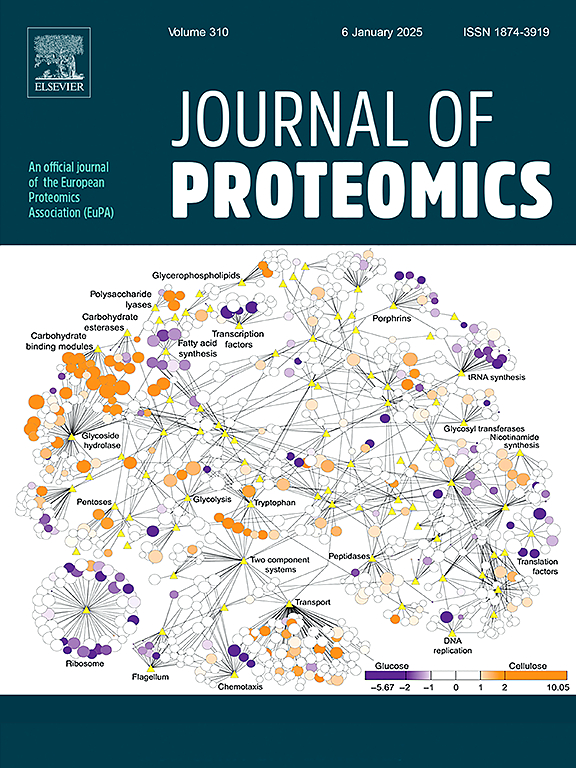The melanoma MEGA-study: Integrating proteogenomics, digital pathology, and AI-analytics for precision oncology
IF 2.8
2区 生物学
Q2 BIOCHEMICAL RESEARCH METHODS
引用次数: 0
Abstract
Melanoma remains the most aggressive form of skin cancer, characterized by high metastatic potential, genetic heterogeneity, and resistance to conventional therapies. The Melanoma MEGA-Study is a multi-center initiative designed to address these clinical challenges by integrating advanced proteogenomic profiling, clinical metadata, with AI-driven digital pathology and machine learning analytics, aiming to enhance personalized treatment strategies and improve patient outcomes. Between 2013 and 2022, a cohort of 1653 melanoma patients each contributed a primary tumor sample, with 361 providing 819 metastatic tumor samples. Clinical data collection for this cohort continued until May 2023. Comprehensive analyses using high-resolution mass spectrometry, optimized workflows for formalin-fixed paraffin-embedded tissues, and advanced digital pathology platforms enabled precise mapping of the tumor microenvironment, identification of metabolic reprogramming, and characterization of immune evasion signatures. The European Cancer Moonshot Lund Center's MEGA-Study, under the academic umbrella of Lund and Szeged universities, marks a significant advancement in its collaborative efforts with the National Institutes of Health (NIH) under the Cancer Moonshot partnership. This initiative exemplifies the center's dedication to pioneering cancer research and underscores the strength of its international collaborations.
Significance
The significance of this study lies in its pioneering integration of high-resolution proteomics, AI-driven digital pathology, and comprehensive clinical annotation to unravel the complex molecular landscape of melanoma. By leveraging a robust, population-based cohort of 1653 patients, including extensive analyses of both primary and metastatic tumor specimens, our approach provides unprecedented insights into the proteogenomic alterations that underpin tumor progression, immune evasion, and therapeutic resistance. The preliminary application of advanced mass spectrometry techniques to formalin-fixed paraffin-embedded tissues, combined with state-of-the-art digital pathology and machine learning, has enabled the identification of novel protein biomarkers and metabolic signatures that hold promise for refining patient stratification and informing personalized treatment strategies. This integrative framework not only deepens our understanding of melanoma biology but also establishes a scalable model for precision oncology that can be extended to other complex malignancies. Ultimately, our findings have the potential to transform clinical practice by facilitating earlier risk stratification, improving prognostication, and guiding the development of targeted therapeutic interventions for this highly aggressive cancer.

黑色素瘤大型研究:整合蛋白质基因组学、数字病理学和精确肿瘤学的人工智能分析
黑色素瘤仍然是最具侵袭性的皮肤癌形式,其特点是高转移潜力、遗传异质性和对传统疗法的耐药性。黑色素瘤大型研究是一项多中心计划,旨在通过整合先进的蛋白质基因组分析、临床元数据、人工智能驱动的数字病理学和机器学习分析来解决这些临床挑战,旨在增强个性化治疗策略并改善患者预后。在2013年至2022年期间,1653名黑色素瘤患者提供了一个原发肿瘤样本,361名患者提供了819个转移性肿瘤样本。该队列的临床数据收集一直持续到2023年5月。综合分析采用高分辨率质谱法,优化了福尔马林固定石蜡包埋组织的工作流程,以及先进的数字病理平台,可以精确绘制肿瘤微环境,识别代谢重编程,并表征免疫逃避特征。欧洲癌症登月计划隆德中心的大型研究,在隆德和塞格德大学的学术伞下,标志着它在癌症登月计划伙伴关系下与美国国立卫生研究院(NIH)的合作努力取得了重大进展。这一举措体现了该中心致力于开拓性癌症研究,并强调了其国际合作的实力。本研究的意义在于开创性地将高分辨率蛋白质组学、人工智能驱动的数字病理学和全面的临床注释相结合,揭开了黑色素瘤复杂的分子景观。通过利用基于人群的1653例患者队列,包括原发和转移性肿瘤标本的广泛分析,我们的方法为支持肿瘤进展,免疫逃避和治疗耐药性的蛋白质基因组改变提供了前所未有的见解。将先进的质谱技术初步应用于福尔马林固定石蜡包埋组织,结合最先进的数字病理学和机器学习,能够识别出新的蛋白质生物标志物和代谢特征,有望改善患者分层和告知个性化治疗策略。这一综合框架不仅加深了我们对黑色素瘤生物学的理解,而且还建立了一个可扩展的精确肿瘤学模型,可以扩展到其他复杂的恶性肿瘤。最终,我们的发现有可能通过促进早期风险分层、改善预后和指导针对这种高度侵袭性癌症的靶向治疗干预措施的发展来改变临床实践。
本文章由计算机程序翻译,如有差异,请以英文原文为准。
求助全文
约1分钟内获得全文
求助全文
来源期刊

Journal of proteomics
生物-生化研究方法
CiteScore
7.10
自引率
3.00%
发文量
227
审稿时长
73 days
期刊介绍:
Journal of Proteomics is aimed at protein scientists and analytical chemists in the field of proteomics, biomarker discovery, protein analytics, plant proteomics, microbial and animal proteomics, human studies, tissue imaging by mass spectrometry, non-conventional and non-model organism proteomics, and protein bioinformatics. The journal welcomes papers in new and upcoming areas such as metabolomics, genomics, systems biology, toxicogenomics, pharmacoproteomics.
Journal of Proteomics unifies both fundamental scientists and clinicians, and includes translational research. Suggestions for reviews, webinars and thematic issues are welcome.
 求助内容:
求助内容: 应助结果提醒方式:
应助结果提醒方式:


